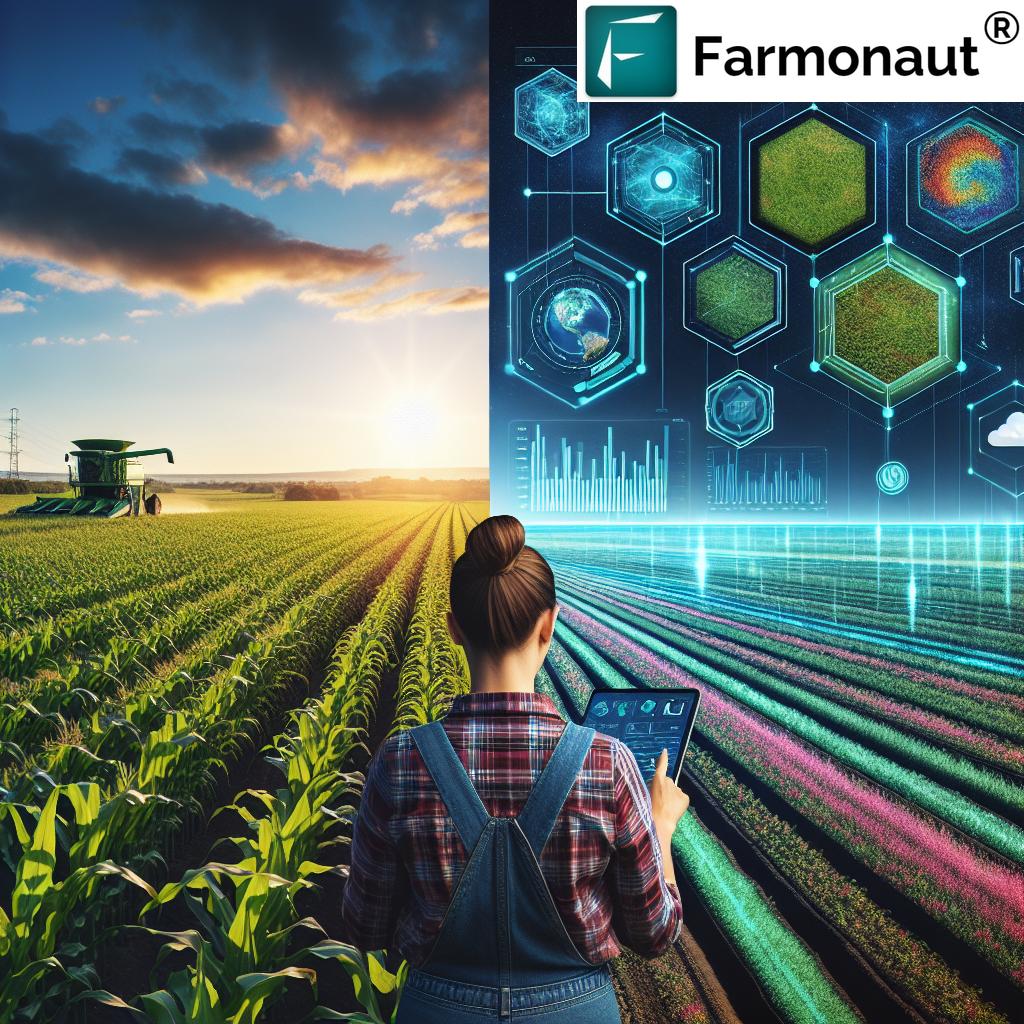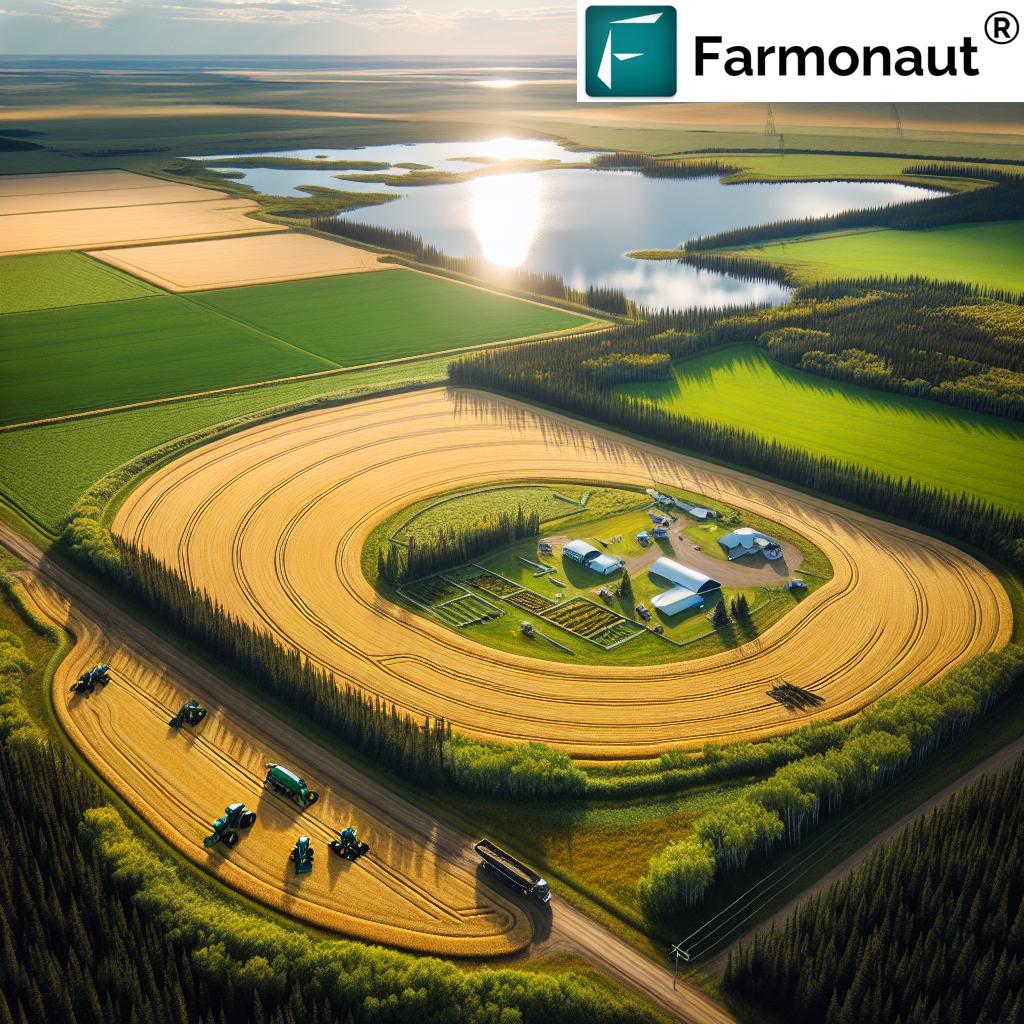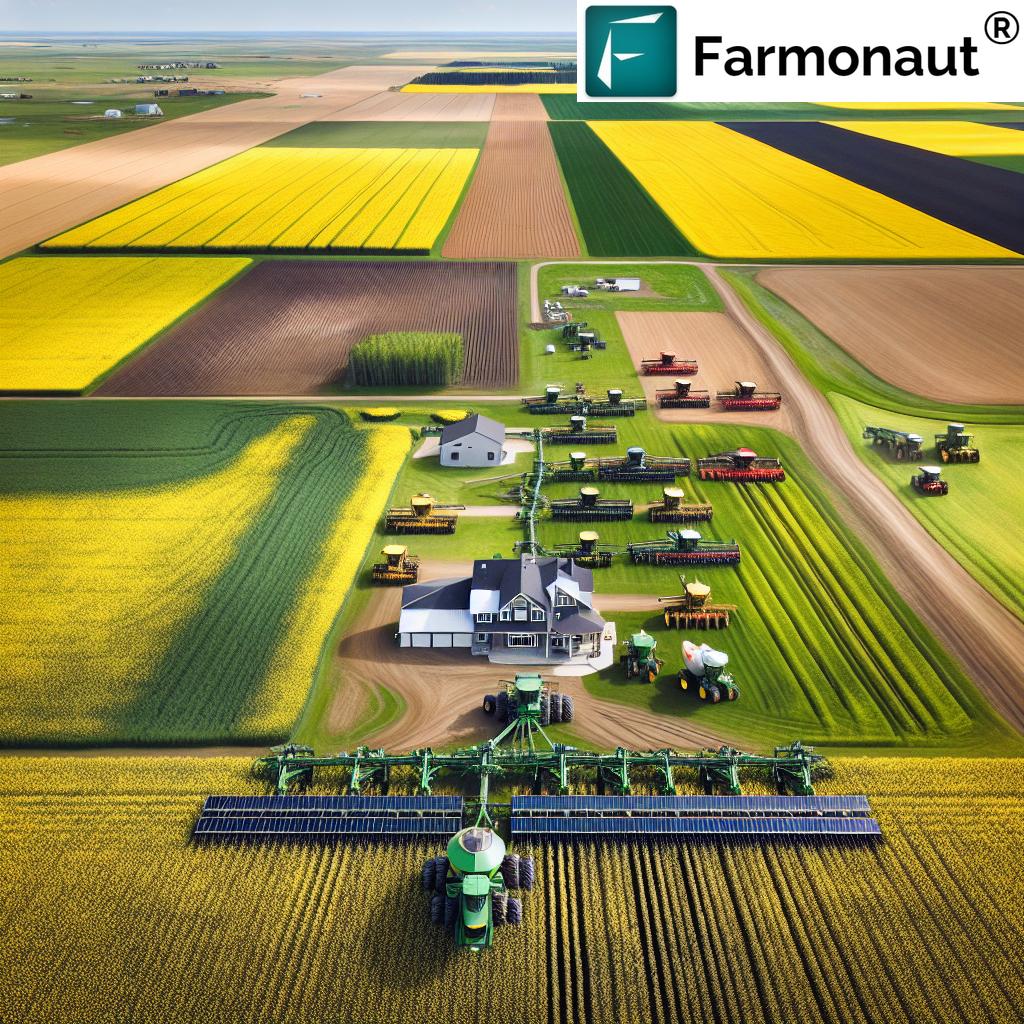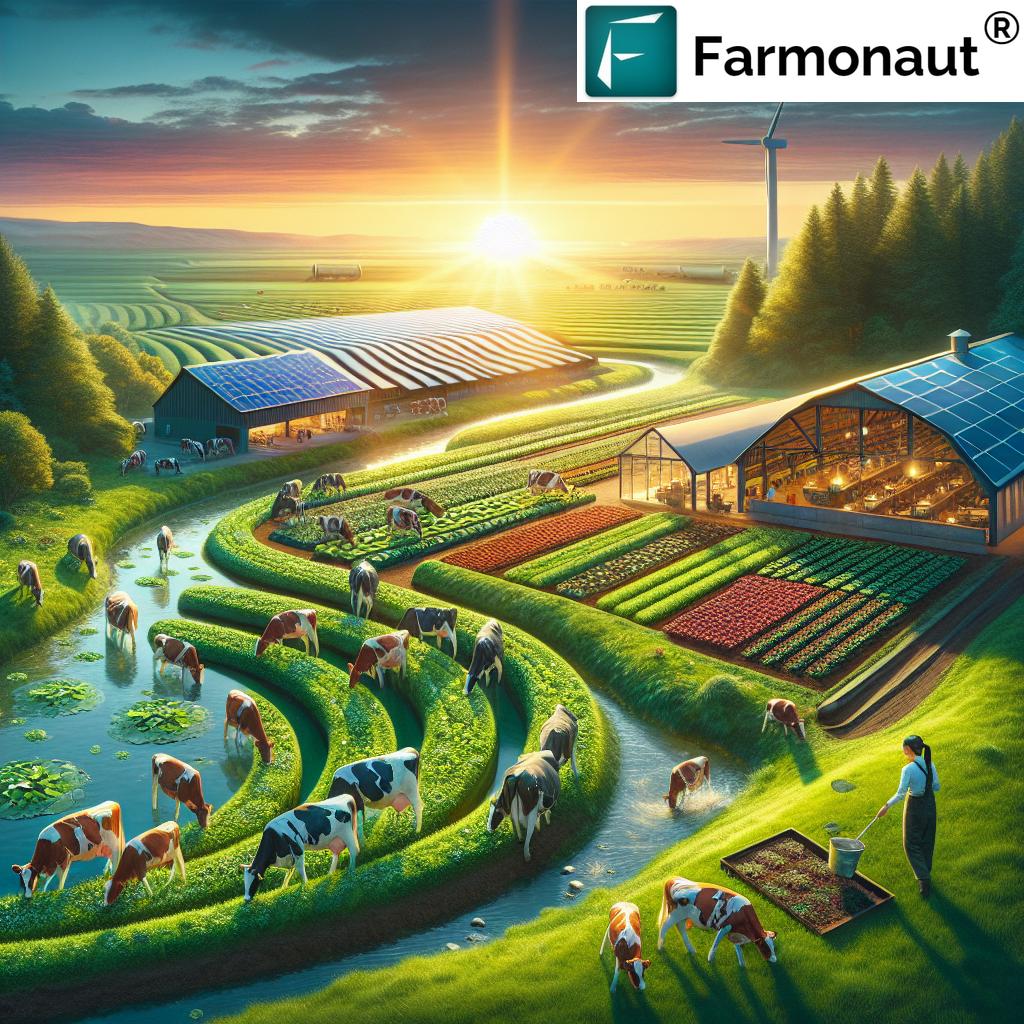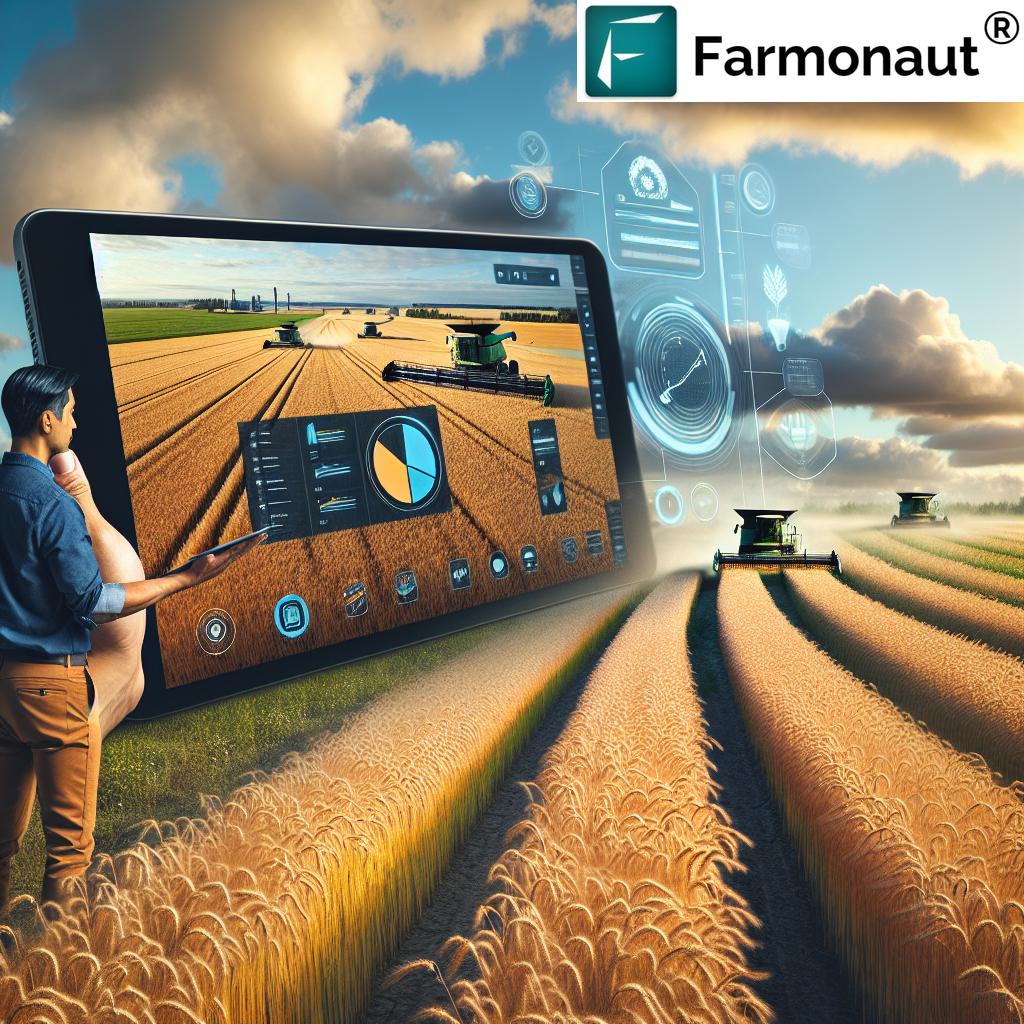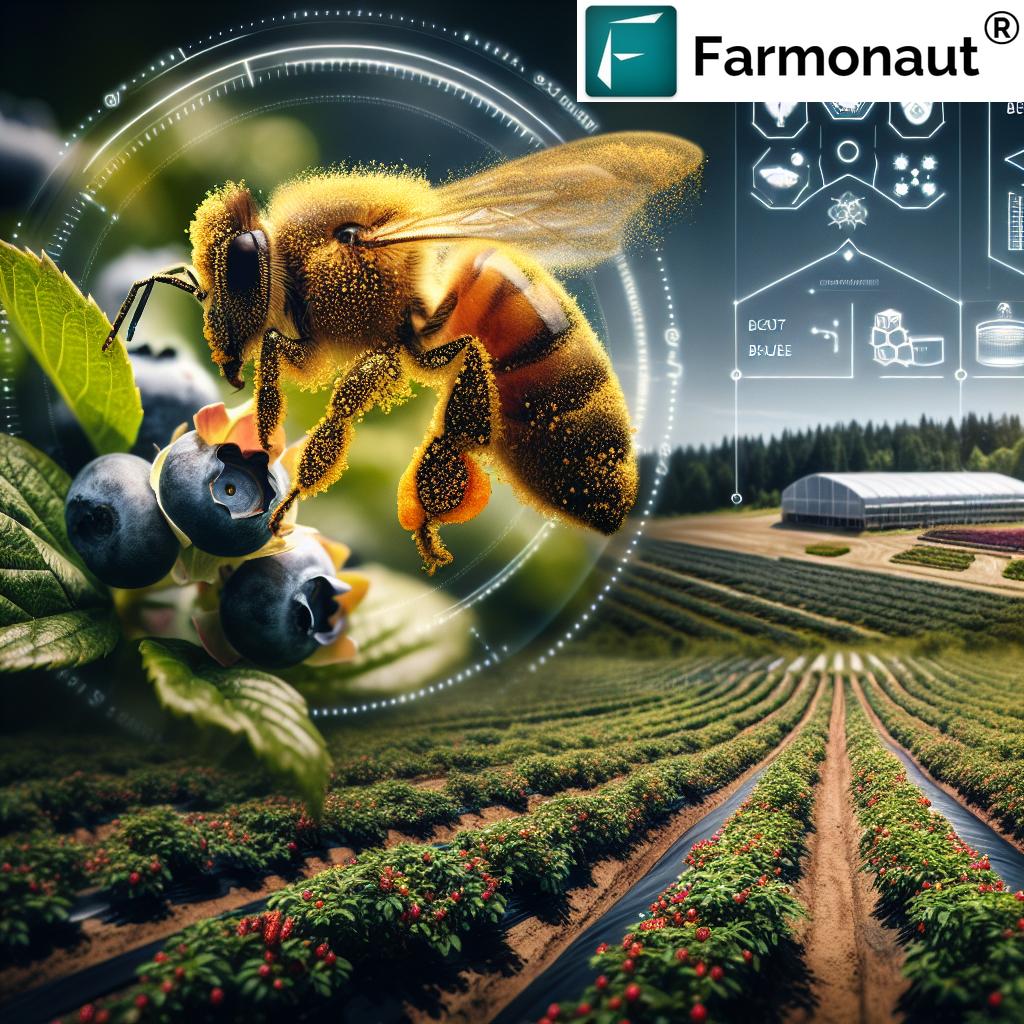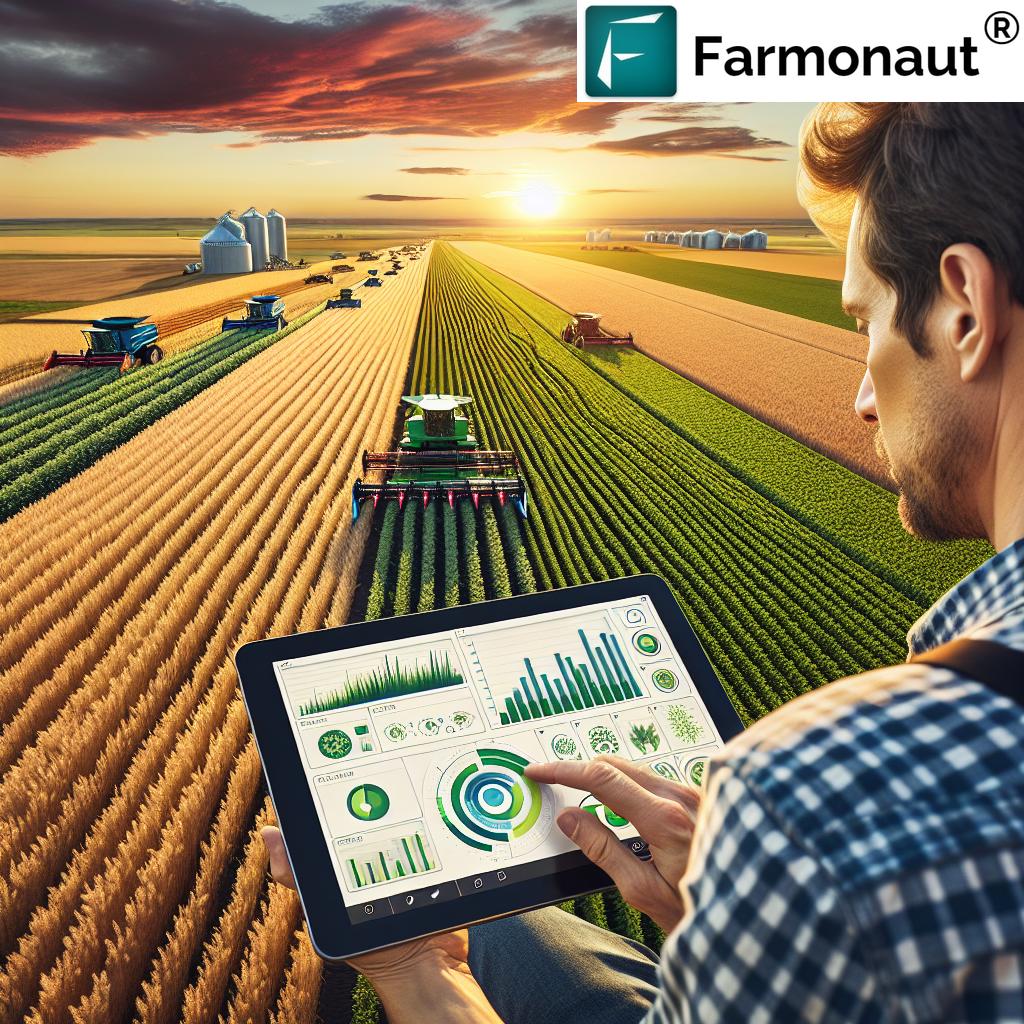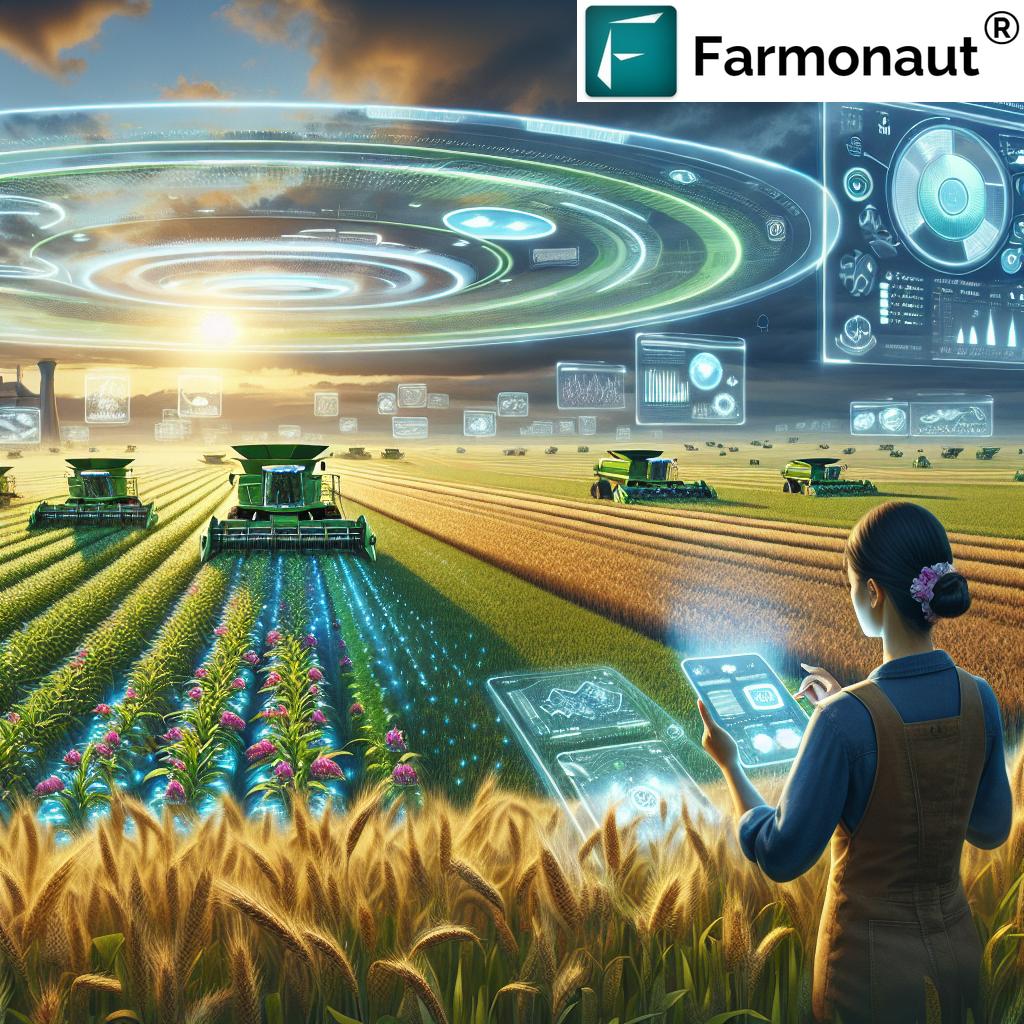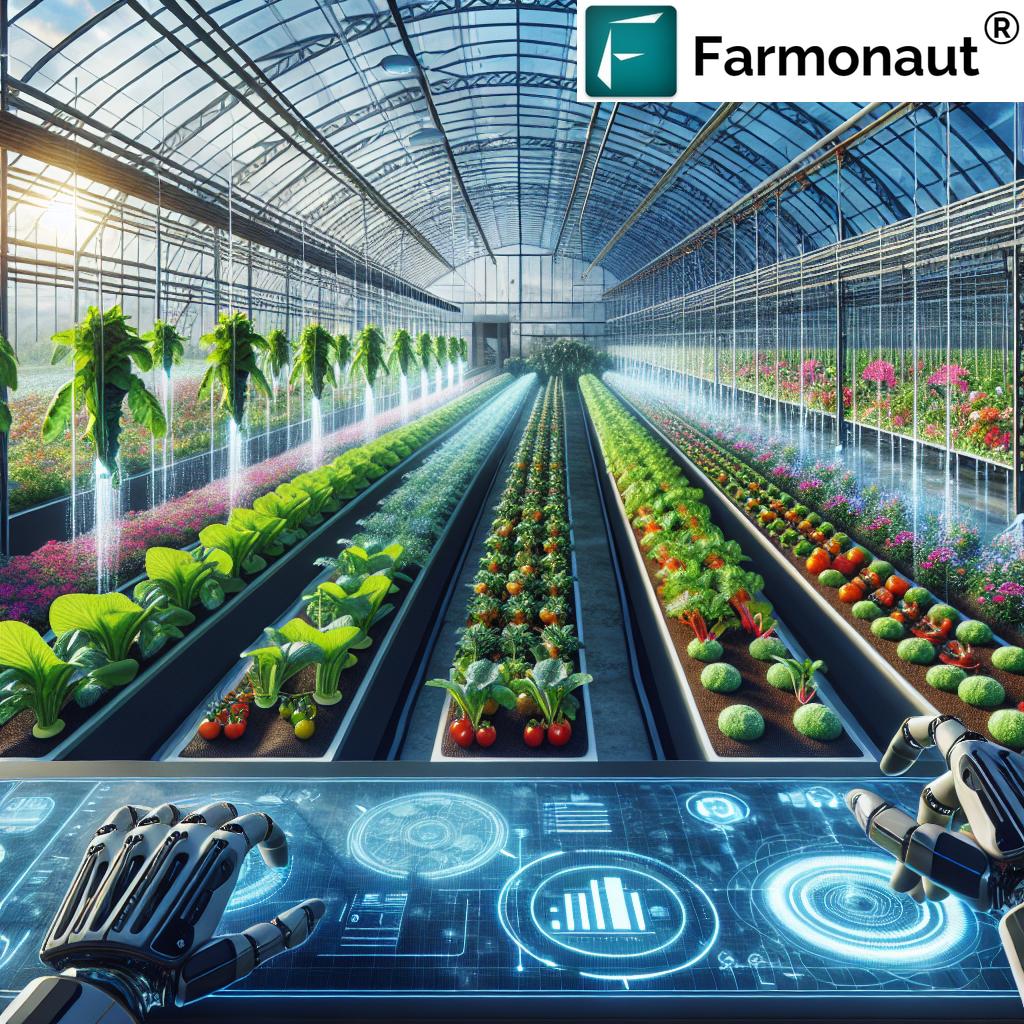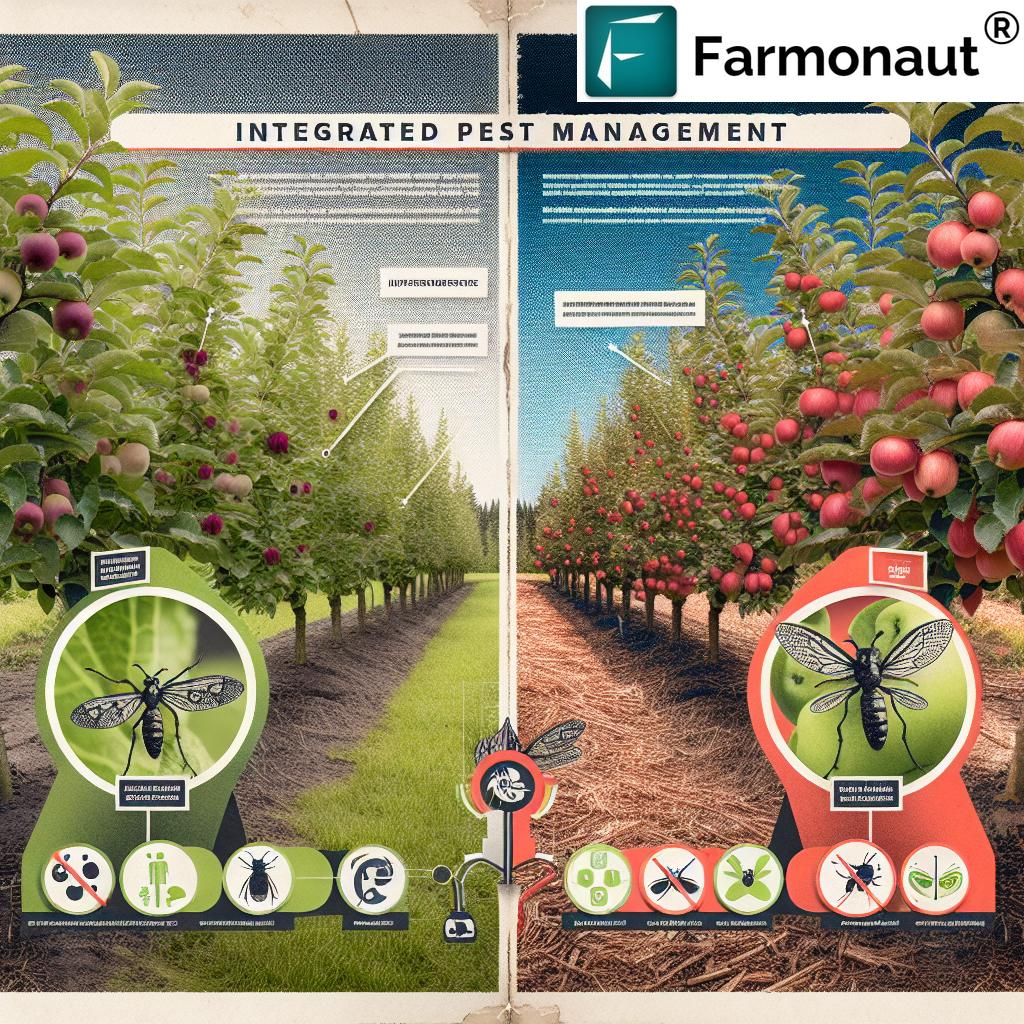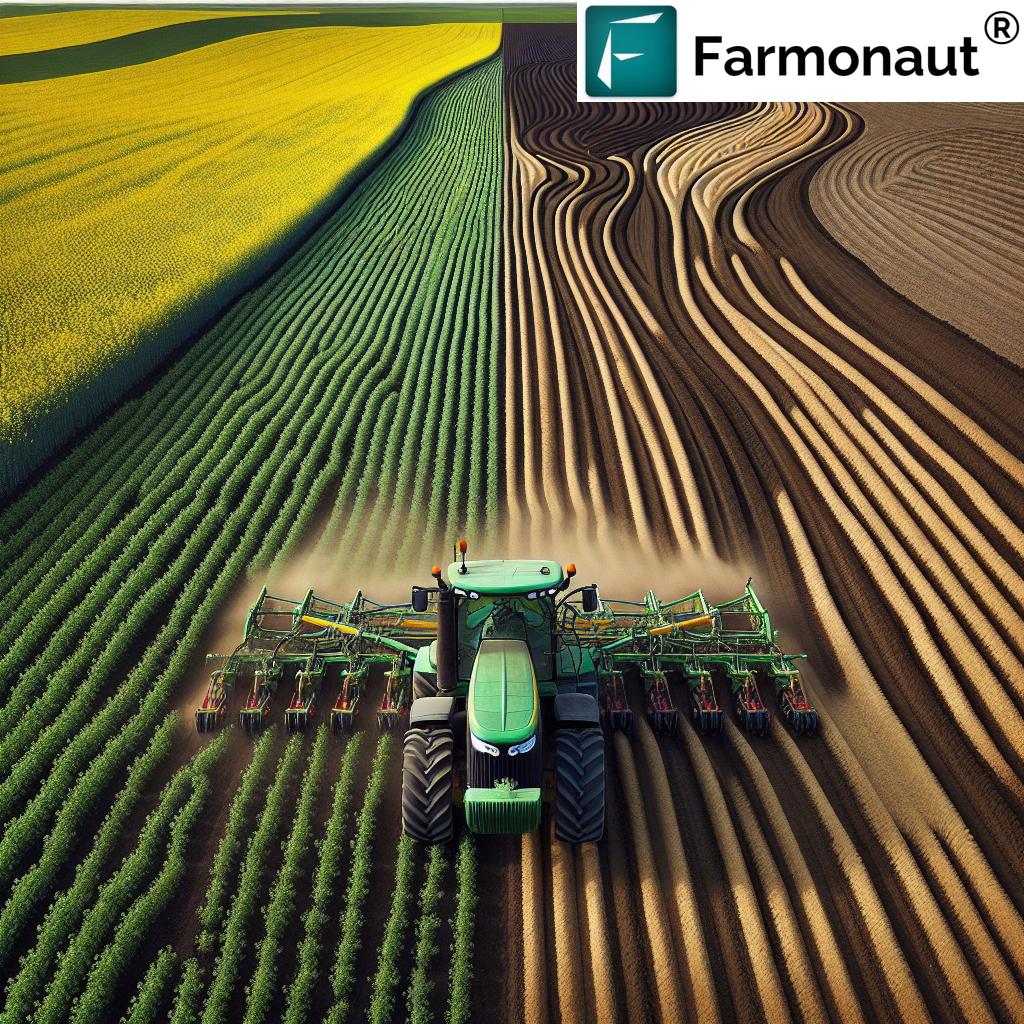Revolutionizing Canadian AgTech: Precision Agriculture Innovations Attract Global Investor Interest
“Canadian AgTech innovations have attracted global investor interest, with precision agriculture leading the charge in sustainable farming.”
In the heart of Canada’s agricultural landscape, a revolution is underway. Precision agriculture technology is transforming the way we approach crop protection and management, drawing the eyes of global investors to the Great White North. As representatives of Farmonaut, we’re at the forefront of this exciting shift, observing and contributing to the wave of agtech innovation sweeping across the nation’s farms and fields.
The Rise of Precision Agriculture in Canada
Precision agriculture, a farming management concept based on observing, measuring, and responding to inter and intra-field variability in crops, has taken root in Canadian soil. This approach to farming is not just changing how we grow food; it’s revolutionizing the entire agricultural industry from the ground up.
- Satellite-based monitoring systems
- AI-driven crop management tools
- IoT sensors for real-time data collection
- Drone technology for aerial crop assessment
These technologies are just the tip of the iceberg in the world of precision agriculture. As we delve deeper into this topic, we’ll explore how these innovations are attracting investor interest and shaping the future of farming in Canada and beyond.
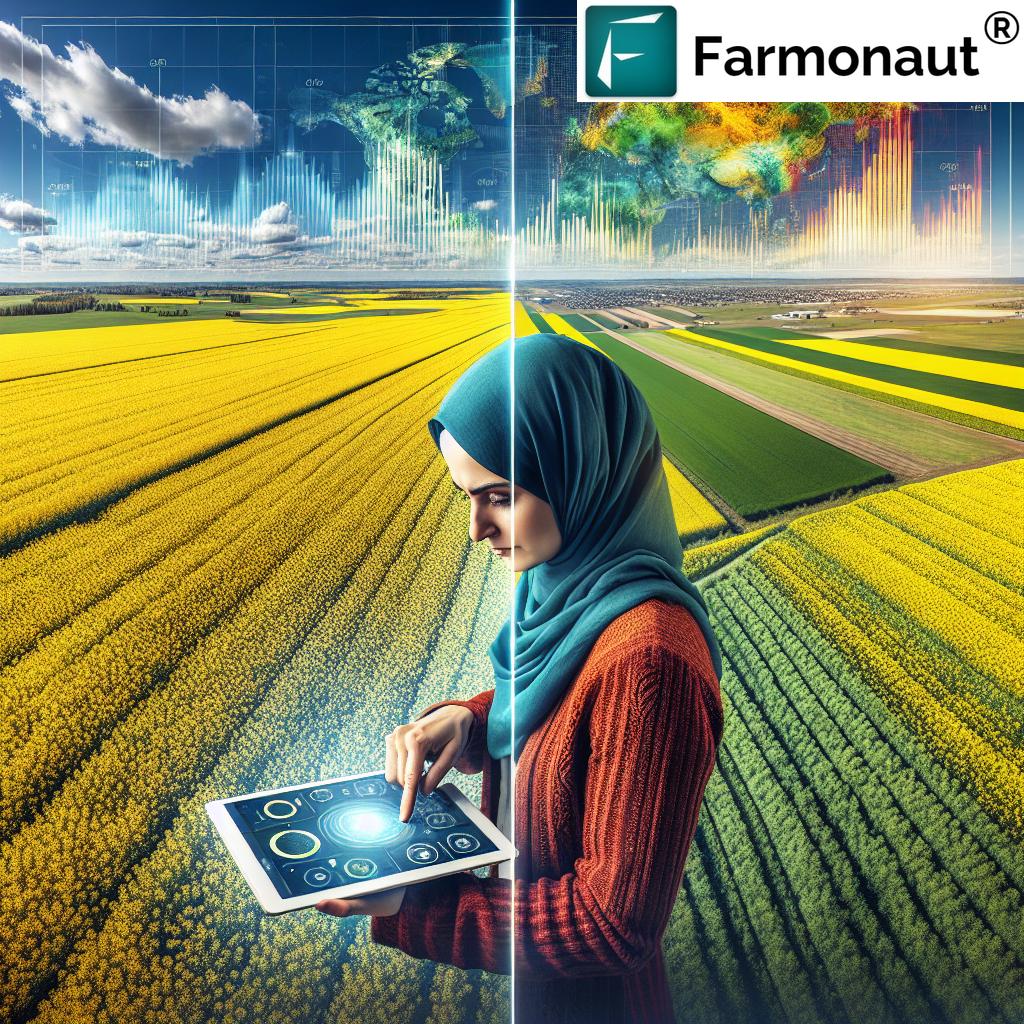
Sustainable Crop Protection: A Key Focus for Investors
One area of precision agriculture that’s particularly catching the eye of investors is sustainable crop protection. Traditional methods of pest and disease control often rely heavily on chemical pesticides, which can have negative environmental impacts. However, innovative approaches are emerging that promise both effectiveness and environmental stewardship.
Biological Pesticide Delivery Systems
Biological pesticide delivery systems represent a significant leap forward in sustainable crop protection. These systems utilize natural or genetically modified organisms to combat pests and diseases, reducing the need for synthetic chemicals. The potential benefits include:
- Reduced environmental impact
- Increased crop yields
- Lower risk of pest resistance
- Improved food safety
Investors are taking note of companies developing these biological solutions, seeing the potential for both environmental and financial returns.
Bee Vectoring: Nature’s Delivery System
“Bee vectoring technology combines natural pollinators with targeted fungicide application, revolutionizing crop disease control in up to 20% of fields.”
One of the most exciting developments in biological pesticide delivery is the use of bee vectoring. This innovative technique harnesses the natural pollination activities of bees to deliver targeted crop protection products directly to plants.
Here’s how it works:
- Bees walk through a tray containing organic, bee-friendly plant protection powder as they exit their hives.
- The powder sticks to their legs and bodies.
- As the bees pollinate crops, they deposit tiny amounts of the powder onto each flower they visit.
- This precise delivery system ensures that the product reaches exactly where it’s needed, when it’s needed.
The potential of bee vectoring has not gone unnoticed by the investment community. The technology offers a unique combination of benefits:
- Reduced chemical usage
- Improved pollination rates
- Targeted application of crop protection products
- Potential for increased yields
As we at Farmonaut observe these developments, we’re excited about the potential synergies between our satellite-based crop monitoring systems and these innovative delivery methods. The combination of precise monitoring and targeted delivery could revolutionize crop protection strategies.
Farmonaut’s Role in the AgTech Revolution
At Farmonaut, we’re proud to be part of this agricultural revolution. Our satellite-based farm management solutions are helping farmers across the globe embrace precision agriculture techniques. By providing real-time crop health monitoring, AI-based advisory systems, and resource management tools, we’re empowering farmers to make data-driven decisions that optimize their yields while minimizing environmental impact.
For those interested in experiencing the power of precision agriculture firsthand, we invite you to explore our platform:
For mobile users, our apps are available on both Android and iOS platforms:
For developers and businesses looking to integrate our technology into their own systems, we offer comprehensive API access:
The Investment Landscape in Canadian AgTech
The surge of innovation in Canadian agriculture has not gone unnoticed by the global investment community. Venture capital firms, private equity groups, and even traditional agricultural companies are all vying for a piece of the AgTech pie. Here’s a closer look at what’s driving this investor interest:
Market Potential
The global precision agriculture market is projected to reach $12.9 billion by 2027, with a compound annual growth rate (CAGR) of 13.1% from 2020 to 2027. Canada, with its vast agricultural lands and tech-savvy farming community, is poised to capture a significant portion of this market.
Government Support
The Canadian government has shown strong support for AgTech innovations through various initiatives and funding programs. This supportive regulatory environment reduces risk for investors and accelerates the adoption of new technologies.
Sustainability Focus
With growing concerns about climate change and environmental sustainability, investors are increasingly looking for technologies that promote sustainable farming practices. Many Canadian AgTech startups are at the forefront of developing these eco-friendly solutions.
Cross-sector Applications
Many AgTech innovations have applications beyond agriculture, such as in environmental monitoring or supply chain management. This versatility makes these technologies even more attractive to investors looking for diverse portfolio opportunities.
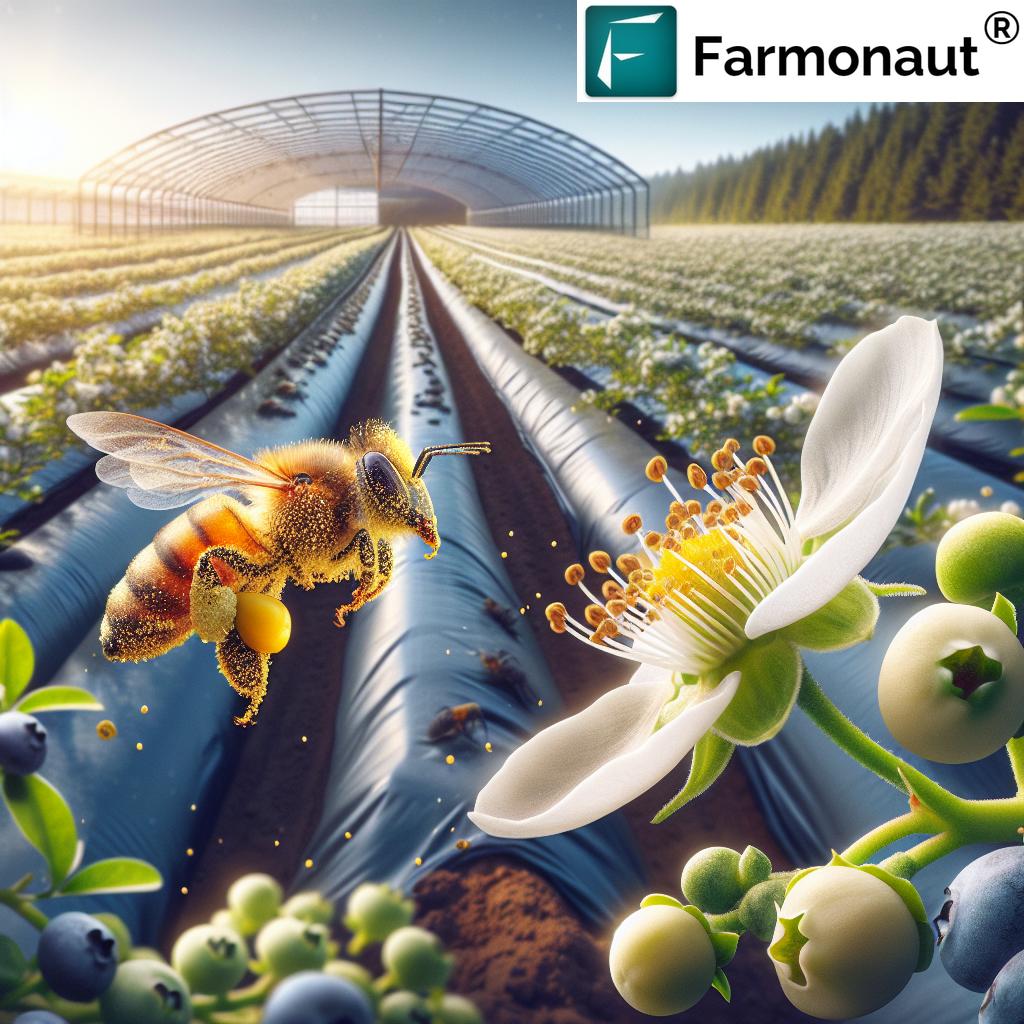
Innovative Farming Techniques Driving Investment
As we examine the landscape of Canadian AgTech, several innovative farming techniques stand out as key drivers of investment interest. These technologies are not only improving farm productivity but also addressing critical challenges in food security and environmental sustainability.
Vertical Farming
Vertical farming is gaining traction in urban areas, allowing for year-round crop production in controlled environments. This technique offers several advantages:
- Reduced water usage (up to 95% less than traditional farming)
- Minimal land requirements
- Proximity to urban markets, reducing transportation costs and emissions
- Year-round production, independent of weather conditions
Investors are particularly interested in vertical farming startups that are leveraging AI and IoT technologies to optimize growing conditions and automate operations.
Precision Seeding
Precision seeding technologies are revolutionizing the planting process. These systems use GPS guidance and variable rate technology to plant seeds at optimal depths and spacing, based on soil conditions and field topography. Benefits include:
- Improved seed germination rates
- Reduced seed waste
- Optimized plant spacing for maximum yield
- Decreased fuel consumption during planting
Companies developing advanced precision seeding technologies are attracting significant investor attention due to the potential for immediate impact on farm productivity.
Robotics and Automation
The integration of robotics and automation in farming is addressing labor shortages and improving efficiency across various agricultural operations. From autonomous tractors to robotic harvesters, these technologies are transforming traditional farming practices. Key areas of development include:
- Autonomous field navigation systems
- Robotic weeding and pest control
- Automated harvesting for fruits and vegetables
- Drone-based crop spraying and monitoring
Investors are particularly excited about the potential of these technologies to address labor challenges and improve overall farm efficiency.
The Role of Data in Precision Agriculture
At the heart of precision agriculture lies data. The ability to collect, analyze, and act on vast amounts of agricultural data is what sets modern farming apart from traditional methods. As a company deeply involved in this space, we at Farmonaut understand the critical role that data plays in driving agricultural innovation.
Satellite Imagery and Remote Sensing
Satellite imagery and remote sensing technologies are providing farmers with unprecedented insights into their fields. These technologies allow for:
- Real-time crop health monitoring
- Early detection of pest and disease outbreaks
- Precise irrigation management
- Yield prediction and harvest planning
Our satellite-based crop monitoring system at Farmonaut is at the forefront of this technology, providing farmers with actionable insights to optimize their operations.
AI and Machine Learning in Agriculture
Artificial Intelligence (AI) and Machine Learning (ML) are transforming how agricultural data is processed and utilized. These technologies are being applied in various ways:
- Predictive analytics for crop yield and market demand
- Automated pest and disease identification
- Optimization of fertilizer and water usage
- Personalized crop management recommendations
The integration of AI and ML in agriculture is creating new opportunities for investors, as these technologies have the potential to significantly improve farm productivity and sustainability.
Blockchain in Agricultural Supply Chains
Blockchain technology is gaining traction in agriculture for its potential to improve transparency and traceability in supply chains. Applications include:
- Tracking the origin and journey of food products
- Verifying organic and fair-trade certifications
- Streamlining payments and contracts between farmers and buyers
- Reducing food fraud and improving food safety
Investors are showing keen interest in startups that are leveraging blockchain to address longstanding challenges in agricultural supply chains.
Environmental Impact and Sustainability
As global concerns about climate change and environmental degradation grow, the agricultural sector is under increasing pressure to adopt more sustainable practices. This shift towards sustainability is not just an environmental imperative; it’s becoming a key factor in attracting investment.
Reducing Chemical Inputs
One of the most significant environmental benefits of precision agriculture is the potential to reduce the use of chemical inputs such as pesticides and fertilizers. Technologies that enable targeted application of these inputs not only reduce costs for farmers but also minimize environmental impact. For example:
- Variable rate technology allows for precise application of fertilizers based on soil needs
- Integrated pest management systems reduce the need for broad-spectrum pesticides
- Biological pest control methods, like bee vectoring, offer chemical-free alternatives
Water Conservation
Water scarcity is a growing concern in many agricultural regions. Precision irrigation technologies are helping farmers optimize water usage:
- Soil moisture sensors provide real-time data on water needs
- Drip irrigation systems deliver water directly to plant roots, minimizing waste
- AI-powered irrigation scheduling optimizes water application based on weather forecasts and crop needs
Soil Health Management
Maintaining and improving soil health is crucial for sustainable agriculture. Advanced soil monitoring and management techniques are gaining traction:
- Precision soil sampling and analysis for targeted soil amendments
- Cover cropping and crop rotation planning based on soil health data
- Minimal tillage practices to preserve soil structure and reduce erosion
Carbon Sequestration and Credits
The potential for agriculture to act as a carbon sink is attracting significant attention from both environmentalists and investors. Technologies and practices that enhance carbon sequestration in soil are becoming increasingly valuable:
- Precision carbon measurement tools for accurate carbon credit calculations
- Regenerative agriculture practices that enhance soil carbon content
- Blockchain-based carbon credit trading platforms for farmers
These sustainability-focused innovations are not only attracting investment but are also opening up new revenue streams for farmers through carbon credit markets.
The Future of AgTech: Trends and Predictions
As we look to the future of AgTech, several trends are emerging that are likely to shape the industry and continue to attract investor interest:
1. Integration of 5G Technology
The rollout of 5G networks is set to revolutionize precision agriculture by enabling:
- Real-time data transfer from field sensors
- Enhanced remote operation of farm machinery
- Improved connectivity for rural farming communities
2. Expansion of Indoor and Vertical Farming
As urbanization continues and arable land becomes scarcer, we expect to see:
- Increased investment in urban vertical farming technologies
- Development of AI-driven climate control systems for indoor farms
- Integration of renewable energy sources in controlled environment agriculture
3. Advancements in Gene Editing and Biotechnology
CRISPR and other gene-editing technologies are opening up new possibilities in crop development:
- Development of climate-resilient crop varieties
- Enhancement of nutritional content in staple crops
- Creation of pest-resistant plant varieties to reduce pesticide use
4. Growth of Precision Livestock Farming
The principles of precision agriculture are expanding into livestock management:
- Wearable technology for real-time animal health monitoring
- AI-driven feed optimization systems
- Automated milking and animal handling systems
5. Increased Focus on Agricultural Cybersecurity
As farming becomes more digitized, protecting agricultural data and systems from cyber threats will become crucial:
- Development of specialized cybersecurity solutions for farm management systems
- Implementation of blockchain for secure data sharing and transactions
- Creation of industry standards for agricultural data protection
Investor Relations in Agriculture: A New Frontier
The influx of technology into agriculture has created a new paradigm in investor relations within the sector. Traditional agricultural companies are now competing for investor attention alongside tech startups and data analytics firms. This shift is reshaping how agricultural businesses communicate with investors and stakeholders.
Key Considerations for AgTech Investor Relations
- Technology Education: Many investors may not be familiar with the intricacies of agricultural technology. Clear, jargon-free communication about the technology and its impact is crucial.
- Metrics and KPIs: Developing and reporting on key performance indicators that demonstrate the efficacy and market potential of AgTech solutions is essential.
- Sustainability Reporting: With increasing focus on ESG (Environmental, Social, and Governance) factors, AgTech companies need to clearly communicate their sustainability impact.
- Market Potential Analysis: Providing comprehensive analysis of the addressable market and growth potential is key to attracting and retaining investors.
- Regulatory Navigation: Keeping investors informed about the regulatory landscape and how the company is navigating it is crucial in the heavily regulated agricultural sector.
Emerging Platforms for AgTech Investor Communication
New platforms and methods are emerging to facilitate communication between AgTech companies and investors:
- Virtual farm tours and demonstrations
- Interactive data visualization tools for crop yield and environmental impact
- Webinars and podcasts featuring farmers using the technology
- Social media campaigns showcasing real-world applications and results
Challenges and Opportunities in Canadian AgTech
While the Canadian AgTech sector is ripe with opportunity, it also faces several challenges that investors and industry players need to be aware of:
Challenges
- Adoption Rates: Convincing traditional farmers to adopt new technologies can be slow and challenging.
- Infrastructure: Rural areas may lack the necessary digital infrastructure to fully implement some AgTech solutions.
- Data Privacy: Concerns about data ownership and privacy need to be addressed as more farm data is collected and analyzed.
- Climate Variability: Canada’s diverse climate zones present challenges in developing universally applicable solutions.
- Regulatory Environment: Navigating complex regulations, especially for biotech and drone technologies, can be time-consuming and costly.
Opportunities
- Government Support: Canadian federal and provincial governments are increasingly supportive of AgTech initiatives.
- Research Collaboration: Strong ties between universities, research institutions, and the private sector foster innovation.
- Export Potential: Canadian AgTech solutions have significant potential for export to global markets.
- Sustainability Leadership: Canada’s focus on sustainable agriculture aligns well with global trends and investor priorities.
- Cross-sector Innovation: Opportunities for technology transfer from other advanced sectors like aerospace and telecommunications.
Comparative Analysis of Precision Agriculture Technologies
To provide a clear overview of the various precision agriculture technologies attracting investor interest, we’ve compiled a comparative table:
| Technology | Primary Function | Environmental Impact | Crop Yield Improvement | Implementation Cost | Investor Interest Level | Market Growth Potential |
|---|---|---|---|---|---|---|
| Farmonaut’s Crop Monitoring System | Satellite-based crop health monitoring | Low | 10-15% | Low | High | High |
| Biological Pesticide Delivery | Eco-friendly pest control | Low | 5-10% | Medium | High | High |
| Bee Vectoring Technology | Targeted crop disease control | Low | 8-12% | Medium | High | Medium |
| Traditional Pesticide Application | Broad-spectrum pest control | High | Variable | Medium | Low | Low |
| Drone-based Crop Imaging | High-resolution field mapping | Low | 5-8% | Medium | High | High |
| IoT Soil Sensors | Real-time soil condition monitoring | Low | 7-10% | Medium | Medium | High |
This comparison highlights the advantages of modern precision agriculture technologies over traditional methods, particularly in terms of environmental impact and potential for yield improvement. It’s clear why technologies like Farmonaut’s Crop Monitoring System are attracting high levels of investor interest, given their low implementation cost and high market growth potential.
The Role of Intellectual Property in AgTech Investment
In the fast-paced world of AgTech innovation, intellectual property (IP) plays a crucial role in attracting and securing investment. Patents, trademarks, and trade secrets are valuable assets that can significantly influence a company’s valuation and investor appeal.
Key Aspects of IP in AgTech:
- Patent Protection: Securing patents for unique technologies and methodologies is crucial for maintaining a competitive edge.
- Licensing Opportunities: Strong IP portfolios can create additional revenue streams through licensing agreements.
- Investor Confidence: Robust IP protection assures investors of the company’s long-term value proposition.
- International Considerations: Given the global nature of agriculture, international IP protection strategies are essential.
For AgTech startups and established companies alike, developing a comprehensive IP strategy is crucial for attracting investment and ensuring long-term success in the market.
Farmonaut’s Subscription Options
As we continue to innovate and expand our services, we’re pleased to offer flexible subscription options to meet the diverse needs of our users. Whether you’re a small-scale farmer or a large agricultural enterprise, we have a plan that’s right for you.
Frequently Asked Questions
As the AgTech sector continues to evolve, we often receive questions from investors, farmers, and industry professionals. Here are some of the most frequently asked questions:
Q: How does precision agriculture technology impact farm profitability?
A: Precision agriculture technologies can significantly improve farm profitability by optimizing resource use, reducing waste, and increasing crop yields. For example, targeted application of inputs like fertilizers and pesticides can reduce costs while improving crop health and yield.
Q: What are the main challenges in adopting AgTech solutions for small-scale farmers?
A: The main challenges often include initial investment costs, technical knowledge requirements, and concerns about data privacy. However, companies like Farmonaut are working to make these technologies more accessible and user-friendly for farmers of all scales.
Q: How does AgTech contribute to sustainable farming practices?
A: AgTech solutions contribute to sustainability by enabling more efficient use of resources, reducing chemical inputs, and providing data-driven insights for better land management. This leads to reduced environmental impact and improved long-term soil health.
Q: What role does government play in the development of the AgTech sector in Canada?
A: The Canadian government plays a crucial role through funding programs, research support, and creating favorable regulatory environments for AgTech innovation. This support helps accelerate the development and adoption of new agricultural technologies.
Q: How can investors evaluate the potential of AgTech startups?
A: Investors should consider factors such as the uniqueness of the technology, market size and growth potential, the strength of the intellectual property portfolio, the team’s expertise, and the solution’s alignment with current agricultural challenges and sustainability goals.
Conclusion: The Future of Canadian AgTech
As we look to the future, it’s clear that Canadian AgTech is poised for significant growth and innovation. The convergence of cutting-edge technologies, sustainable farming practices, and increasing global food demand creates a perfect storm of opportunity for investors and industry players alike.
Key takeaways include:
- Precision agriculture technologies are revolutionizing farming practices, improving efficiency and sustainability.
- Innovative solutions like biological pesticide delivery and bee vectoring are attracting significant investor interest.
- Data-driven farming, powered by satellite imagery and AI, is becoming the new norm in agriculture.
- Environmental sustainability is a key driver of innovation and investment in the AgTech sector.
- The Canadian AgTech ecosystem, supported by government initiatives and strong research collaborations, offers unique opportunities for global investors.
As we at Farmonaut continue to develop and refine our satellite-based farm management solutions, we’re excited to be part of this dynamic and rapidly evolving industry. The future of agriculture is tech-driven, sustainable, and full of potential. For investors, farmers, and technology enthusiasts alike, Canadian AgTech represents a frontier of innovation with the power to transform global food production and environmental stewardship.
We invite you to join us on this exciting journey. Whether you’re an investor looking for the next big opportunity, a farmer seeking to optimize your operations, or a tech enthusiast passionate about sustainable solutions, the world of AgTech has something to offer. Together, we can cultivate a future where technology and nature work in harmony to feed the world sustainably.
Stay Connected with Farmonaut
To stay updated on the latest developments in AgTech and Farmonaut’s innovative solutions, we encourage you to:
- Follow us on social media for real-time updates and insights
- Subscribe to our newsletter for in-depth analysis and industry trends
- Explore our website for detailed product information and case studies
- Reach out to our team for personalized consultations and demos
The future of agriculture is here, and it’s more exciting than ever. Let’s cultivate innovation together.





